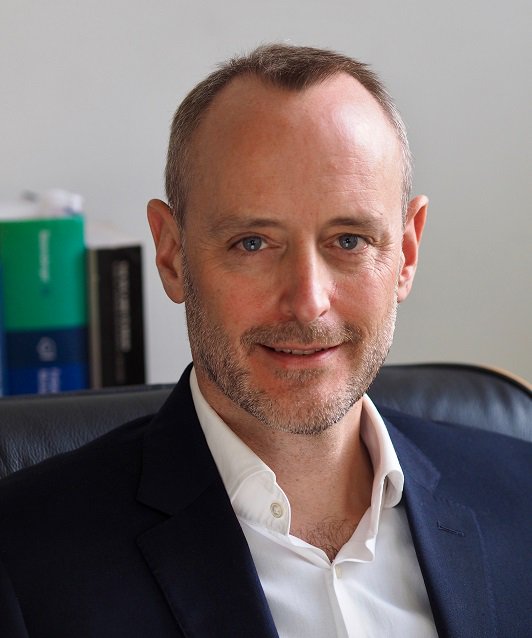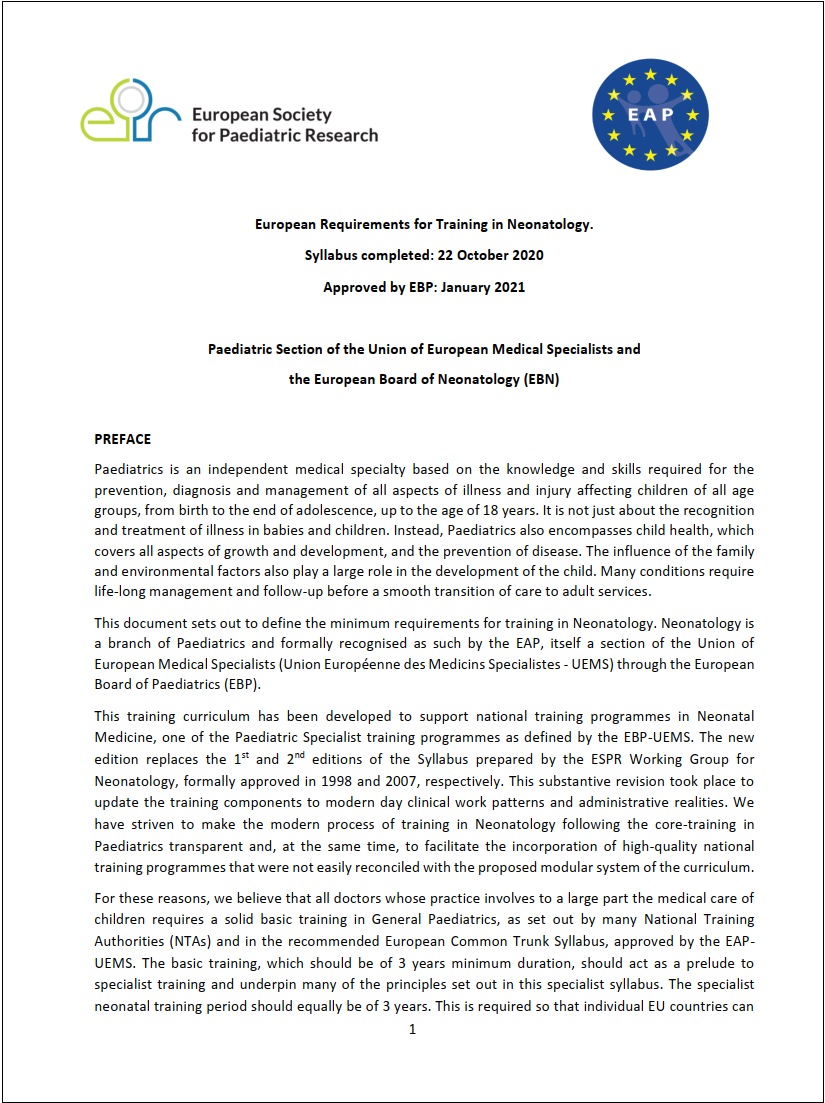European Board of Neonatal & Child Health Research (EBNCHR)
Representing the interests of the ESPR and neonatal research in Europe
The European Board of Neonatal & Child Health Research (EBNCHR) - formerly the European Board of Neonatology (EBN) - is the policy arm of the ESPR.
As a representative body, the EBNCHR is composed of one country representative from each EU National Neonatal Society or Perinatal/Paediatric Society if no Neonatal Society exists.
The EBNCHR has four key responsibilities within the ESPR:
- To represent and advocate for the society's interests at the European political level;
- To periodically review and update the European Training Requirements in Neonatology (ETR);
- To achieve the full implementation of the ETR Neonatology at EU member-state level;
- To foster international research collaboration.
-
The European Training Requirements (ETR) in Neonatology
The European Training Requirements in Neonatology (ETR Neonatology) represent a curriculum that has been developed to support national training programmes in Neonatal Medicine, one of the Paediatric Specialist training programmes as defined by the UEMS (Union Européenne des Medicins Specialistes) through the European Board of Paediatrics (EBP).
The new, 2021 issue replaces the first and second editions of the Syllabus prepared by the European Society for Paediatric Research (ESPR) Working Group for Neonatology, formally approved in 1998 and 2007, respectively.
The document has the objective to define the minimum requirements for training in Neonatology by adapting it to modern-day, clinical work patterns and administrative realities. It strives to make the up-to-date process of training in Neonatology following the core-training in Paediatrics transparent, while facilitating the incorporation of high-quality national training programmes that were not easily reconciled with the modular system of the ETR Neonatology.
The revision was led by a UEMS-appointed board of examined specialists in neonatal medicine with years of experience at senior staff level, all being experienced neonatal educators with extensive knowledge in policy development and members of the ESPR. The process of generating the ETR Neonatology included the review of existing European policy documents on training requirements, the second edition of the ETR (Version 2007), national European syllabi and also recently-published, by an international collaboration, European Standards of Care for Newborn Health.
Furthermore, through the initiative of the European Board of Neonatal and Child Health Research (EBNCHR) – the policy arm of the ESPR – consultations among representatives of >30 European national neonatal societies were sought to actively contribute items for inclusion in the ETR to ensure international applicability.
The result is a truly Pan-European curriculum for neonatal training, including suggestions suitable for countries throughout Europe independently of their level of income.
You can download the ETR Neonatology v2021 here.
-
Open letter to EU Commission - access to essential medical devices
The European Academy of Paediatrics (EAP) and 22 other European associations dedicated to child health and medical care (including the ESPR) are joining forces to address the critical issue of maintaining access to essential medical devices for children and other patients with orphan diseases. In an open letter to Commissioner Kyriakides, the EAP calls for urgent action to prevent the loss of crucial medical devices necessary for optimal patient care.
The following policy decisions are being proposed to the European Commission and the European Parliament:
- Correct the unintended consequences of the EU Medical Device Regulation to ensure continued access to essential medical devices for children and patients with orphan diseases.
- Establish an EU-wide monitoring system to track devices that may disappear from or have disappeared from the market.
- Delegate the assignment of "paediatric device" or "orphan device" status to an EU Expert Panel with competent paediatric experts, enabling simplified and cost-effective conformity assessments similar to the US Humanitarian Device Exemption regulation.
- Expedite the conformity assessment process for high-risk devices with paediatric or orphan device status, involving clinical and paediatric expertise, and implementing a capped maximum fee to incentivize the introduction of devices for small patient groups.
The complete letter, along with the supporting societies, can be downloaded here.
-
Call for members of the EBNCHR Research Funding Working Group
The EBNCHR is looking for motivated society members and external experts to join its newly founded Research Funding Working Group. With the objective to provide leadership in the context of child health research policy, the group seeks to achieve the following goals within a 5-year timeframe:
- To identify objectives and the resources needed / chances of success;
- To determine a single, key goal for policy change or funding opportunity;
- To lobby for a policy change or funding opportunity (1 – 5 years).
The group will engage in key advocacy activities, such as:- Legislative analyses and monitoring;
- Intelligence gathering & strategic recommendations;
- Preparation of position papers and amendments;
- Networking and coalition building;
- Advocacy and lobbying.
In addition, as a member of the Research Funding Working Group, you may be asked to answer to European Commission consultations and attend meetings in Brussels with policy-makers.Are you interested in getting involved and shaping the future of child health research policy? Then contact the ESPR office via office@espr.eu.We look forward to hearing from you! -
Meet the EBNCHR Council

Charles Christoph Roehr
EBNCHR Chairperson, MD, PhDProfessor of Neonatal and Perinatal Medicine, Faculty of Health and Life Sciences, University of Bristol, UK
-
Clinical Trials Unit, National Perinatal Epidemiology Unit, Oxford Population Health, Medical Sciences Division, University of Oxford, UK
Olivier Danhaive
Lead ESPR Research FundingWorking Group, MDCliniques Universitaires Saint-LucBelgium -
Contact info
For more information or questions about the EBNCHR, please contact the ESPR Secretariat via office@espr.eu.


